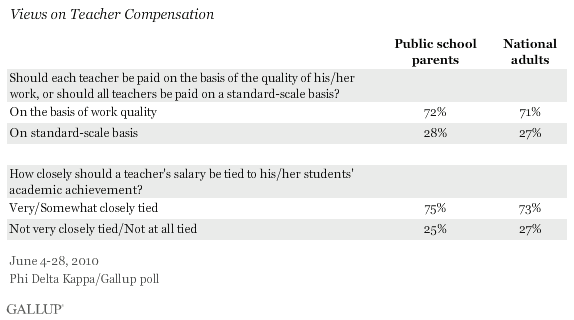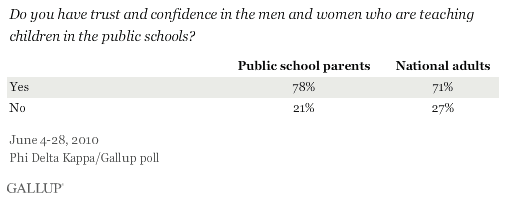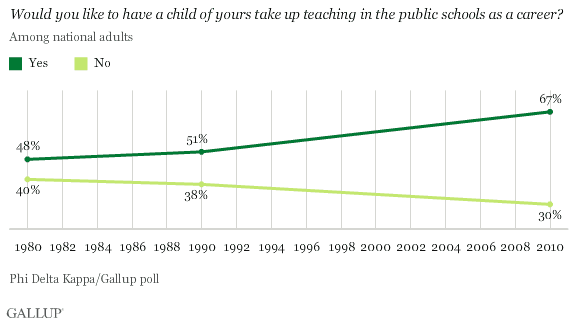WASHINGTON, D.C. -- The large majority of parents with children in the public K-12 school system would like to see teacher pay revolve around teacher performance, not the standard scale of pay. Seventy-two percent of public school parents say teachers' salaries should be tied to the quality of their work. Additionally, 75% say teachers' salaries should be somewhat or very closely tied to their own students' academic achievement.

On the flip side, 28% of public school parents want teachers compensated based on a "standard scale," which was not defined in the question wording, but typically would involve a teacher's experience and education level. Similarly, 25% say pay should be not at all or not very closely tied to student academic achievement. The views of all national adults align closely with those of public school parents.
These findings are based the annual Phi Delta Kappa/Gallup survey on the nation's schools, conducted June 4-28. PDK is a professional association for educators.
Nearly 8 in 10 public school parents say they have trust and confidence in the men and women who teach in the public school system. This is similar to the 77% of public school parents who have a high level of confidence in their child's school, giving the school's performance a grade of "A" or "B."

Although a slightly smaller percentage of all American adults, compared with parents, have trust and confidence in the nation's public school teachers (71% vs. 78%, respectively), it is still a strong majority. At the same time, 79% of national adults give the nation's public schools a grade of "C" or lower.
Even though thousands of teachers have been laid off over the past two years, and schools across the country continue to face intense budget problems, more Americans, 67%, now say they would like to have a child of theirs take up teaching in the public school system as a career than did so when Gallup and PDK asked the question in 1990 (51%) and 1980 (48%).

Bottom Line
The Gallup/PDK findings reveal that the large majority of public school parents in America support the idea of a teacher compensation system based on performance rather than on a "standard scale." The majority of parents also think teachers' salaries should be at least somewhat closely tied to student achievement. But in many school districts, pay is not currently determined on the basis of teacher quality or student outcomes; rather, it is determined largely by a standard scale system, typically based on seniority. The Obama administration last year launched a federal grant program, "Race to the Top," one requirement of which is for competing states to link student achievement to teachers.
Despite the disconnect between parents' ideas for how teachers should be compensated and the current teacher compensation framework in the nation's public schools, most parents do have trust and confidence in public school teachers. This positivity comes during a tough time for the nation's public schools and can be a source of pride for teachers and public education leaders.
Read the full results of the 42nd annual 2010 PDK/Gallup poll of the Public's Attitudes Toward the Public Schools.
Results for this PDK/Gallup Poll are based on a panel study involving telephone interviews with 1,008 adults nationally, aged 18 and older, conducted June 4-28, 2010. Gallup Panel members are recruited through random sampling methods. The sample included an oversample of Panel members who reported having a child aged 5 to 18 in the household.
For results based on the total sample of national adults, one can say with 95% confidence that the maximum margin of sampling error is ±3.5 percentage points.
Interviews are conducted with respondents on landline telephones and cellular phones, with interviews conducted in Spanish for respondents who are primarily Spanish-speaking. Each daily sample includes a minimum quota of 150 cell phone respondents and 850 landline respondents, with additional minimum quotas among landline respondents for gender within region. Landline respondents are chosen at random within each household on the basis of which member had the most recent birthday.
Samples are weighted by gender, age, race, Hispanic ethnicity, education, region, adults in the household, cell phone-only status, cell phone-mostly status, and phone lines. Demographic weighting targets are based on the March 2009 Current Population Survey figures for the aged 18 and older non-institutionalized population living in U.S. telephone households. All reported margins of sampling error include the computed design effects for weighting and sample design.
In addition to sampling error, question wording and practical difficulties in conducting surveys can introduce error or bias into the findings of public opinion polls.
For more details on Gallup's polling methodology, visit https://www.gallup.com/.
